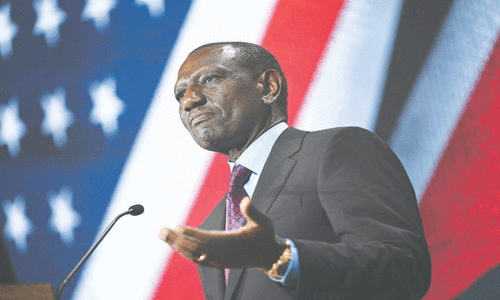BRUSSELS: With nine months still to go before the EU’s biggest expansion yet, the enlarged bloc is already getting into its stride, although not without teething troubles — such as finding somewhere for everyone to sit.
The 10 countries in line to join the 15-nation European Union next year are already participating in EU meetings as non-voting observers and counter-signing declarations issued in the bloc’s name.
When they accede on May 1, the newcomers — eight former members of the Soviet bloc plus the Mediterranean islands of Cyprus and Malta — will enjoy all the trappings of EU power.
Their entry into the EU is being acclaimed as a definitive end to Europe’s Cold War-era divisions. But the organisation faces more prosaic challenges in accommodating a vastly increased number of participants.
Not least of these is finding room for everyone in the imposing Council of Ministers building in Brussels.
Bureaucrats from the accession countries have been forced to hang around in the corridors until the issue they are in town to address comes up on the agenda.
“We have to invite them in by SMS text message,” said one EU diplomat.
After the enlargement, EU ministers will find themselves straining to follow distant interlocutors at the opposite end of a huge rectangular table.
The solution: the bloc is planning to install TV screens for each minister so that he or she can more clearly see who is speaking.
“It’s shaking things up. It’s a totally different atmosphere,” said another diplomat, mourning the passing of “much of the spontaneity that we’re used to having at meetings”.
The TV screens will enable the ministers to see each other, but they will also have to understand each other.
For each new language coming to Brussels with enlargement — there are nine official ones among the accession countries in addition to the 11 of the present member states — the EU is creating an extra 124 interpreting jobs.
But the old and the new member states are already learning to communicate as they tease out each other’s positions.
According to Czech diplomat Libor Bohac, each of the current member states is keen to explore alliances with the incoming countries on the issues that most concern it.
On the future of the EU’s costly farm subsidies, France is likely to earn friends among heavily agricultural entrants such as Poland. But Britain will more easily find allies for its stand in foreign relations.
“The majority of the entrants are disciplined agents of Washington,” joked a diplomat in reference to the divisions over Iraq that so convulsed the EU.
The 10 countries joining the EU next year are Cyprus, the Czech Republic, Estonia, Hungary, Latvia, Lithuania, Malta, Poland, Slovenia and Slovakia.
Most firmly aligned themselves with the United States and Britain over the war against Saddam Hussein, infuriating French President Jacques Chirac who lectured them to keep quiet.
All the signs, however, are that the accession countries fully intend to have their say in the EU — over a state-of-the-art PA system to ensure their voices are heard from the other side of a cavernous room.—AFP













































Dear visitor, the comments section is undergoing an overhaul and will return soon.